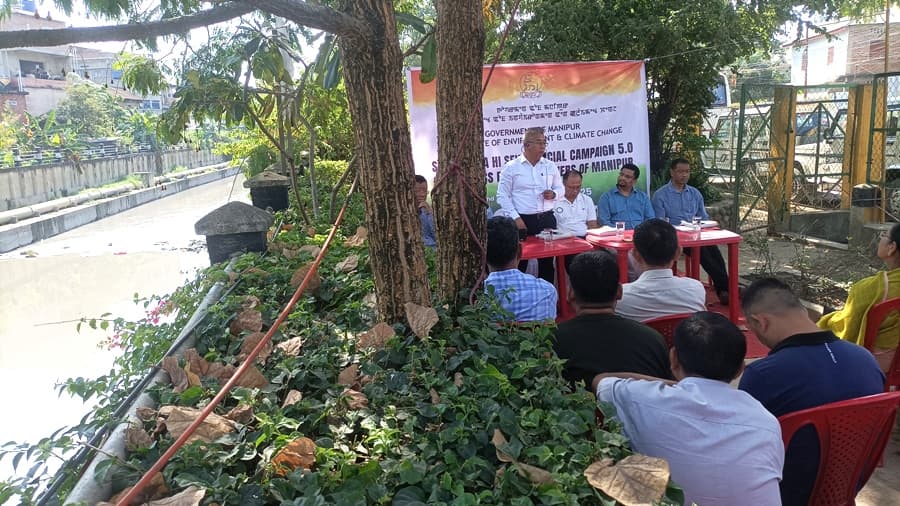Efforts on to transform Nambul riverbank into a beautiful riverbank garden.
Share

IMPHAL — Manipur's Directorate of Environment and Climate Change (DoECC) is working with local communities and stakeholders to transform the Nambul riverbank, previously a garbage dumping site, into a beautiful riverbank garden.
This initiative aims to rejuvenate and protect the river, and is being undertaken with the support of residents living along the riverbank.
The effort is inspired by the success of the Nambul riverfront garden at Keishamthong stretch in Imphal city, which was recently developed with the help of local clubs and women's groups, and now boasts a fresh and new look.
A campaign to save rivers was also held as part of the month-long Swachhata campaign, which began on October 2 and is scheduled to conclude on October 31. The campaign was held at the Nambul riverfront garden, a newly developed riverbank garden at Keishamthong, Imphal, on Thursday, with representatives of local clubs and residents living along the riverbanks in attendance.
The campaign was attended by several dignitaries, including Dr T Brajakumar, Director of DoECC; Sakket Kumar, Executive Engineer of NEID (CWC) Silchar; Th Gopimohon, president of Nambul River Development Committee (NRDC) Sana-Janmasthan; Th Mahendra Pratap, President of Sana-Janmasthan Club; and Thounaojam Alexander, Development Officer of DoECC.
The event was organised by Nambul River Development Committee Sana-Janmasthan, Sana-Janmasthan Club, and Sana-Janmasthan Women Group, in collaboration with DoECC.
Also read: Manipur tour operators urge pre-arrival PAP applications to boost foreign tourism
Manipur to introduce Best Reporter Award for climate change reporting
Volunteers of Nambul River Development Organization, Nambul Kanba Lup (Ward number 11& 12) and Nambul River Protection Committee (NRPC) Iroishemba, also attended the event.
Assistant Professor Dr. Likmabam Sanjoy of DM University delivered a talk on “Why we need to save and protect our rivers in the state.”
Later, addressing the campaign-cum-awareness event, Dr. Brajakumar said that the authority plans to convert approximately 9km of the Nambul riverbank into riverbank gardens, with the support of the general public from 8 municipal councils residing along the riverbank.
This initiative aims to rejuvenate and protect the river. The Nambul river, which is approximately 60km long, originates from Kounu hills and flows through the valley area, passing through the state capital and the busy Imphal market, before emptying into Loktak, the largest freshwater lake in Northeast India.
The Nambul River, once among the most polluted rivers in the country, has shown significant improvement since the commissioning of a sewage treatment plant at Heirangoithong in Imphal West district under the Nambul river rejuvenation programme, led by the DoECC.
The department has also been conducting various environmental awareness programmes through schools, colleges, and media platforms. As Manipur's rivers face increasing pressure from human activities, the ongoing campaigns aim to rekindle a sense of collective responsibility among citizens, reminding them of the vital role rivers play in sustaining the state's environment, culture, and economy.